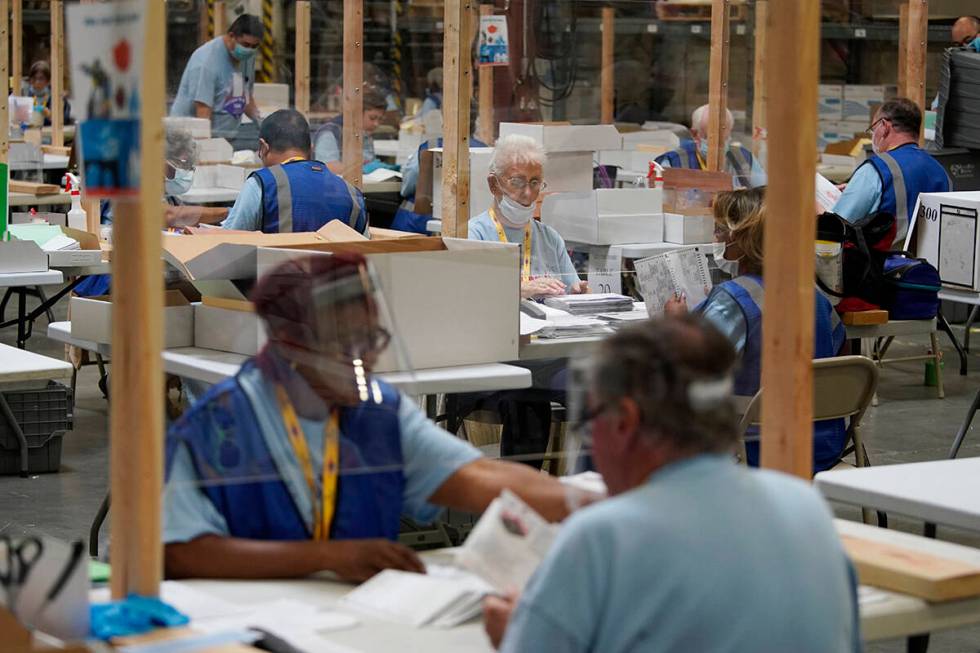Bid to criminalize fake elector schemes moves forward in state Senate

CARSON CITY — Nevada lawmakers voted to advance a handful of bills aimed at changing election laws, beating a Friday deadline to move legislation out of committees.
Lawmakers on the Senate’s Legislative Operations and Elections Committee voted 3-2 to approve Senate Bill 133, legislation that would criminalize conspiring to create or serve in a false slate of electors.
The crime would be classified as a category B felony, punishable by a sentence of four to 10 years in state prison without the possibility of probation. In addition, the state or local governments could not employ or appoint to public office any person convicted of a violation.
An amendment to the bill had to be altered during the meeting because of an error, and Senate Minority Leader Heidi Seevers Gansert, R-Reno, voted against advancing the bill because she said she didn’t have enough time to review the amendment. Sen. Lisa Krasner, R-Reno also voted no.
The bill comes in response to a group of Republican electors who signed fake certificates in December as part of a scheme to allow President Donald Trump to remain in office. The electors met at the legislative building in Carson City, signed the documents and sent them to Washington, D.C. The certificates were never counted, however.
Senators also voted to advance Senate Bill 60 out of the committee on a vote of 4-1, with Krasner voting no.
Although the bill would originally have extended the time to count mail-in ballots to nine days after Election Day, up from the current seven, that provision was amended out of the legislation.
Use them or lose money
Senate Bill 215, which advanced out of the committee on a vote of 3-2, would require any local government that accepted state money to buy voting machines to return those funds if the jurisdiction decides not to use those machines and instead conduct an election by paper ballot.
Krasner and Seevers Gansert voted no.
The bill comes after Nye County decided to conduct the 2022 general election by paper ballots counted by hand instead of electronic machines. But the county did use its electronic vote-counting machines to tabulate the paper ballots, and used the hand count as a “parallel process.”
The committee also heard Senate Bill 406, legislation which would make it a category E felony to use or threaten to use force, intimidation, or violence against an election worker with an intent to interfere with that person’s duties. It would also criminalize publicizing personal or identifying information about election workers.
An amendment to the bill removed a provision that would allow city or county clerks, secretary of state employees and their spouses, domestic partners or minor children to be able to request a court order to keep their records confidential.
“We feel this bill gives prosecutors the tools they need to go after bad actors and halt the chilling effects that these unprecedented threats have had on our democracy,” said Chief Deputy Secretary of State Gabriel Di Chiara.
The bill drew support from several groups, including the Culinary Union, Clark County, the American Civil Liberties Union of Nevada, Battle Born Progress and the Las Vegas Metropolitan Police Department, among others.
“I personally have been the recipient of a stalker during the primary election last year and death threats during the general election,” said Douglas County Clerk Treasurer Amy Burgans. “There wasn’t a lot of teeth to be able to do anything about it. This bill will assist in that.”
No paper ballots at polls
Meanwhile, the Assembly’s Legislative Operations and Elections Committee debated Assembly Bill 242 Tuesday afternoon , which would prohibit the use of paper ballots for in-person voting at polling places and require all ballots be counted by electronic vote-counting machines.
Assemblywoman Tracy Brown-May, D-Las Vegas, said the changes were sought to make voting as accessible as possible to people with disabilities, including disabilities that aren’t readily apparent. “It’s really important that we have accessibility in all of our voting,” she said.
Officials from the secretary of state’s office also said machine-counted results will always be more accurate than those tabulated by hand.
“We know that a machine is better at counting ballots than any group of people can be, especially when you have to follow procedures,” Di Chiara said.
Contact Steve Sebelius at SSebelius@reviewjournal.com. Follow @SteveSebelius on Twitter.